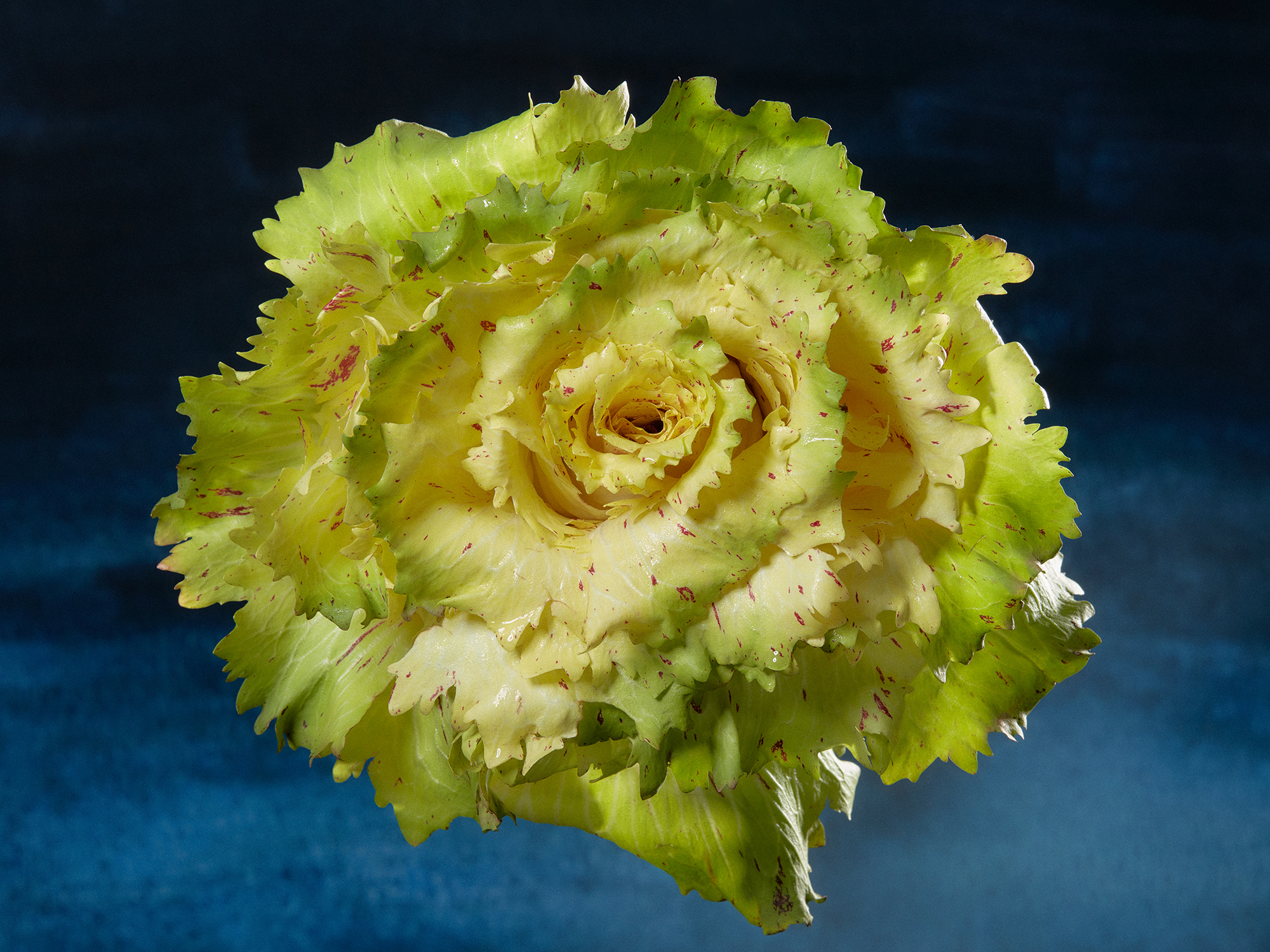
Justin Guthrie & David Brandon Geeting
In conversation
︎
A generous phone transcription discussing storytelling, intention, sobriety, and Jackass era masculinity
David : Well, I feel like the world is always changing, and I think a lot of times truth is kind of stranger than fiction. So yeah, I mean, I just trust that New York City will always have new weird shit going on. You know, I'm not really sure exactly what I'm looking for, but I think it's also a mix of manifestation, like I'm gonna go for a walk and bring my camera because I know I'm gonna see some weird stuff -- and then I see it! It's a mix of that. I'm not sure if it's specific subject matter that I'm looking for, but as a photographer -- and I'm sure you experience this walking around as well -- I sort of just see the world composed in photos. I often feel like I'm just looking through a viewfinder and I'm kinda like, "Oh, that's cool. I could take a photo where I kind of position that in the top right, and like, maybe this thing will be out of focus in the foreground." Or I'll be like, "Oh, that thing is really cool because of the light that it's in." My head is on auto pilot all the time anyway, so I'm always just looking for photos, no matter where I am.
Justin : True. So for instance, in the Spider Man photo next to the creamer in the blue bag -- what drew you to take this photo? Was it like the immediate blue? Or was it the Spider Man? I mean, Spiderman is very New York in a way, too.
David: Yeah man, I think it's funny, it's like a super hero trapped inside of a trash bag. Like he's been deemed powerless.
Justin : I think it's like a lost childhood in a way, you know, like some kid just grew out of it. Now it's trash.
David : Yeah. I mean, it's just that notion that everything gets recycled, even our bodies, you know? Even heroes are disposable.
David: Yeah man, I think it's funny, it's like a super hero trapped inside of a trash bag. Like he's been deemed powerless.
Justin : I think it's like a lost childhood in a way, you know, like some kid just grew out of it. Now it's trash.
David : Yeah. I mean, it's just that notion that everything gets recycled, even our bodies, you know? Even heroes are disposable.
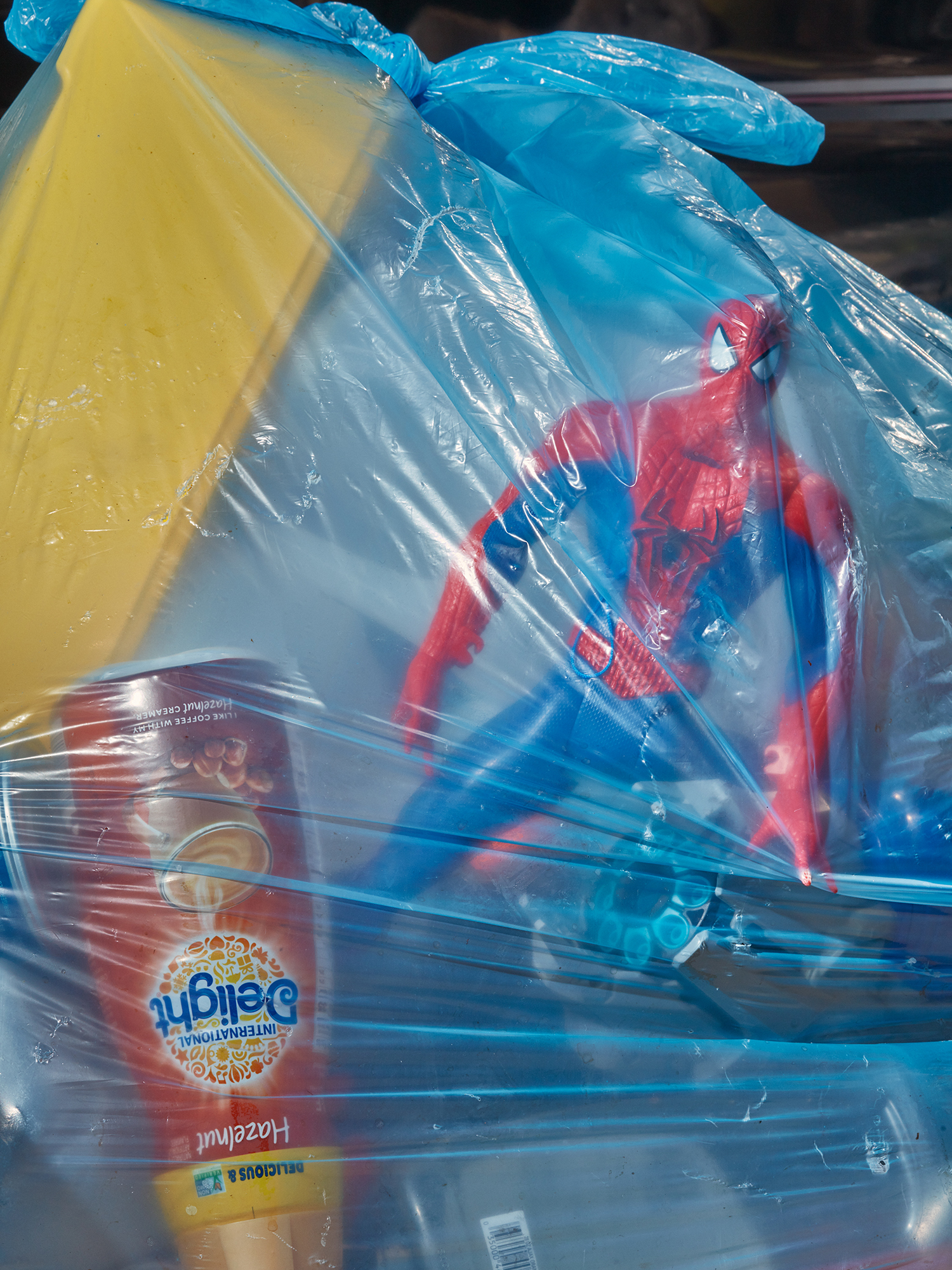
David Brandon Geeting
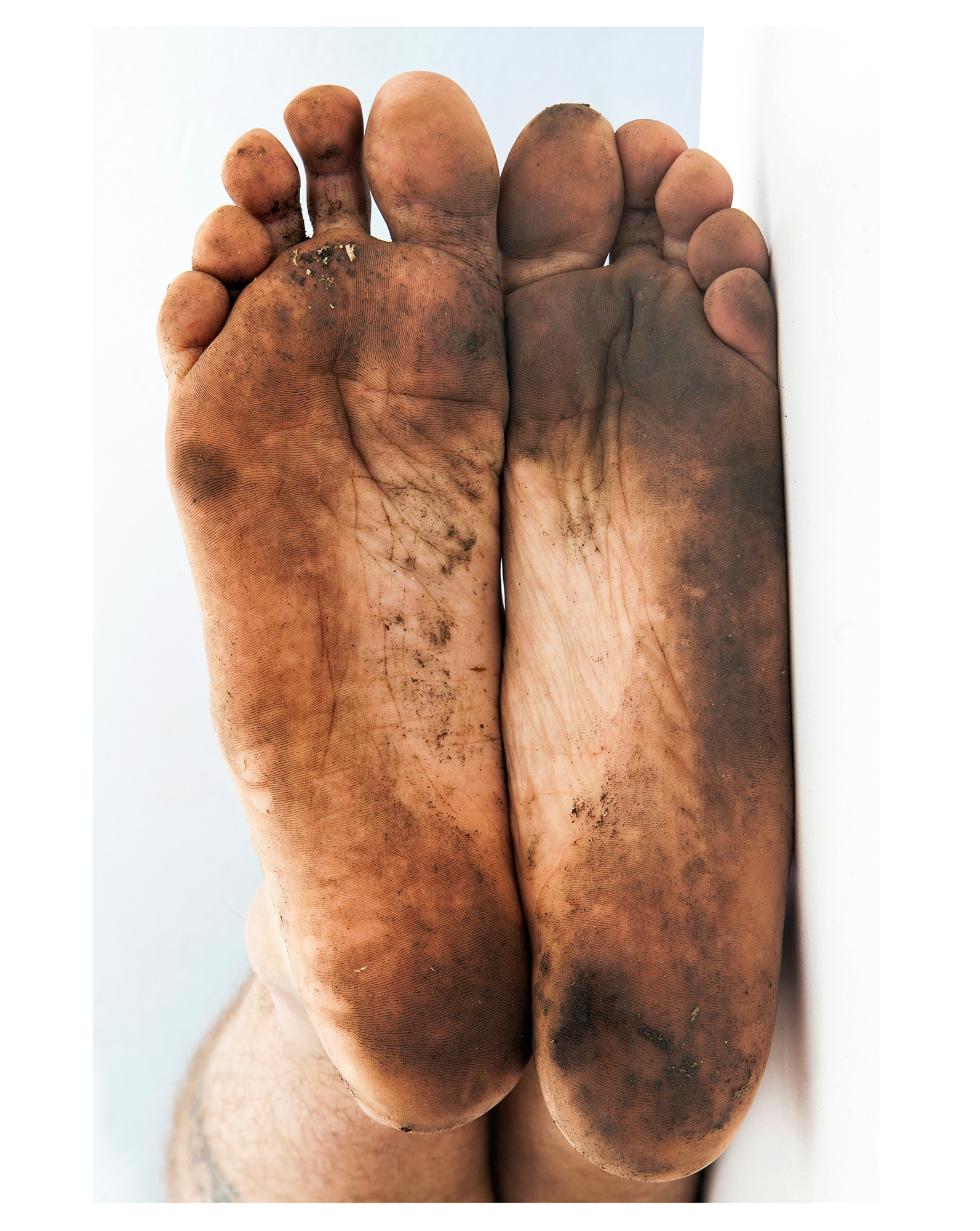
Justin Guthrie
Justin: True. So, going back to what you were saying about how you like looking at life through a lens; for me, I can't speak for you or anyone else, but I did a lot of psychedelics, perhaps too young in life. And the world just opened up in a different way for me, where I started to see the world in a way where everything was only lines and shapes. Colors and patterns started to appear more in everyday happenings, you know, like in a classic psychedelic trip. But for me, it outlasted the psychedelic trip. When it was all said and done, I kinda came away with this understanding of color, and appreciation for compositions, and it just stuck with me after. So when I go on walks now, it's almost like appreciating the world for how it naturally is, appreciating its beauty.
David : I can relate to that, yeah. Well, really quickly --it's funny that you mentioned the word "beauty" because I feel like depending on who's looking at your photographs, I'm not sure that that word would be synonymous with what they're looking at, but I actually think your photographs are really beautiful. Because, even though the content can be sort of gross or edgy, or, I don't know, not PG all the time... the way you go about depicting things is beautiful or sometimes magical or poetic in a way.
Justin : Thank you, appreciate that. Like, just yesterday I took a photo where someone spray painted a flower on a tree. I could tell that the person who painted the flower did it as a gesture of beauty. It wasn't like a middle finger, you know, or like a 69 or something. It was just a beautiful flower, simple. I was just thinking of how ironic it is that it's hurting the tree. You know, it's putting toxicity into the tree, but it was meant as a gesture of love or, like, happiness. So those are the types of things that I'm drawn to, where it's like, life made its own sculpture and I'm just appreciating it for what it is, and hopefully people can see that.
David : That all comes through in your work, and I think I sort of view the world in a similar way. I've had debates with friends in the past about that last thing you said -- about "What is art?" Is this thing in front of me already art? Or is it art after I take a photo of it? Is the composition what makes it art, or, you know, the fact that you capture it and put it out in the world, and NOW there's a dialogue surrounding it that makes it art? I always kind of think that art is all around us and, like, I'm just kind of a collector of all the "art" that I see and respond to, you know?
Justin : Mhhhm. I mean, that's a good way to look at. Like everything can be art. Maybe art is too small of a word for how grand life actually is. You know, like sometimes you really have to have, like, a near death experience to really appreciate all that life is, and that everything is magic. It's all about people deciding what is and what isn't art, as if there's a criteria for anything. And maybe, realistically, everything's art. I mean, if you think of music, all it is is vibrations. But when you decide what vibration hits where, then it's a song. The same thing with photos, a little bit. It's like, it all exists already, but once you put these things in order, it can become art.
David : Well, when I'm thinking about a photograph in particular, I'm also thinking about painting a little bit. Like, say someone painted a composition that looked exactly like the Spiderman in the trash photo -- perhaps it would be taken more seriously. You and I are talking about art photography because we're art photographers and we get it. We know how to look at the medium, but a lot of people still don't.
Justin : I feel like it almost goes to show that the more intention you put into something, the more it seems like it's art, and because photography is random, especially street photography, it seems like less of art because there's supposedly less intention involved. And the intention is put on afterwards. Somehow painting gets more credibility because it came from someone's mind rather than just seeing it and giving it importance.
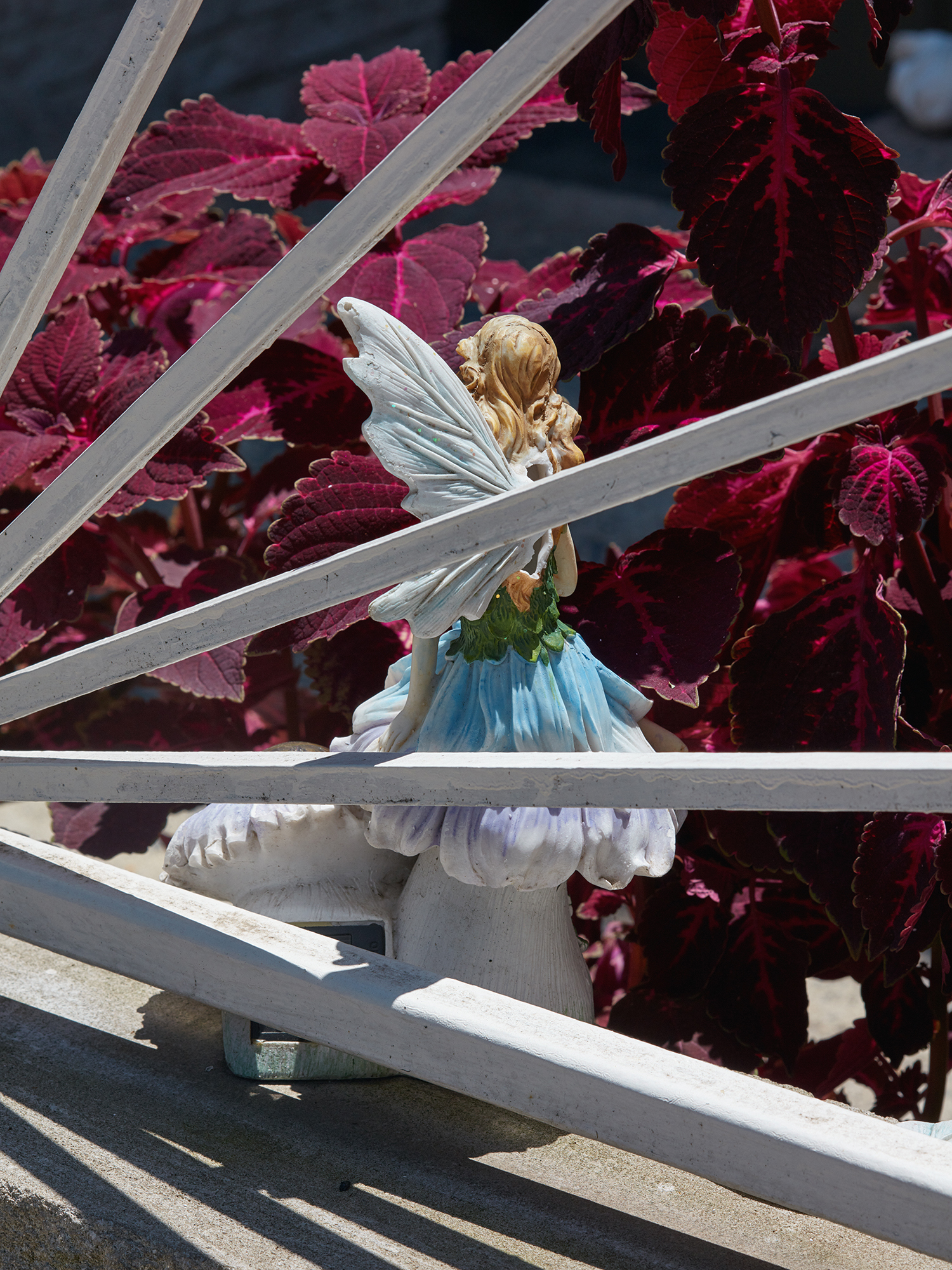
David Brandon Geeting
David: I guess that's where I tend to differ in my thought process from whoever else you're talking about, because I think that intention does not matter at all. It's really just the finished product that I'm looking at. I kinda don't care how something got there, you know?
Justin: I agree, a sunflower doesn't care that it's called a sunflower, you know?
David: Yeah, that couldn't be more true. There's so much more beauty in something than the name that man gave it.
I wanted to go back to what you called "street photography," because I think both of us do this thing where we sort of dissect bits of the world. We don't go ahead and arrange it in a narrative, feature-length-film type way. We don't really emulate older documentary photography books or anything like that. From what I've seen of your work, and how I know I go about my work, we're not so interested in this narrative of what we're pulling things out of. We're more interested in kind of rearranging things to fit our own narratives and what we're trying to say. So even if the photos were taken on the street, they're almost so far removed from the tradition of street photography or documentary photography. What do you think?
Justin: I think so, too. I guess I can look at it like this. It's like, say, Beethoven or Mozart. There's a certain way they made their music where it's all about notes, chords, and perfect structure and that's what was beautiful about it. But there's something psychedelic and new about the way Brian Wilson made the Beach Boys music, where it's a song about a car or surfing, and yet it speaks so much beyond that, where it's so spiritually uplifting and beautiful, and just the feeling alone of their music can make you feel heartache, love, or sadness. The lyrics are just a shiny vehicle for Brian Wilson to put his true intention behind it all.
Justin: I agree, a sunflower doesn't care that it's called a sunflower, you know?
David: Yeah, that couldn't be more true. There's so much more beauty in something than the name that man gave it.
I wanted to go back to what you called "street photography," because I think both of us do this thing where we sort of dissect bits of the world. We don't go ahead and arrange it in a narrative, feature-length-film type way. We don't really emulate older documentary photography books or anything like that. From what I've seen of your work, and how I know I go about my work, we're not so interested in this narrative of what we're pulling things out of. We're more interested in kind of rearranging things to fit our own narratives and what we're trying to say. So even if the photos were taken on the street, they're almost so far removed from the tradition of street photography or documentary photography. What do you think?
Justin: I think so, too. I guess I can look at it like this. It's like, say, Beethoven or Mozart. There's a certain way they made their music where it's all about notes, chords, and perfect structure and that's what was beautiful about it. But there's something psychedelic and new about the way Brian Wilson made the Beach Boys music, where it's a song about a car or surfing, and yet it speaks so much beyond that, where it's so spiritually uplifting and beautiful, and just the feeling alone of their music can make you feel heartache, love, or sadness. The lyrics are just a shiny vehicle for Brian Wilson to put his true intention behind it all.
David : This reminds me of a note I have written in my phone from 2014, like over seven years ago. It says, "If a chair is calling to me to take its portrait (which is a common occurrence, things seem to call to me, not the other way around), it is not because it looks or feels like a chair. It's because, at that very moment in time and space, and from that specific vantage point, it feels so much unlike a chair that it needs to be made into an image to further admire it."
Justin : Yeah, I agree. I think that's really cool.
David : I haven't looked at that note in a while, but I feel like it still rings true. It's kind of like, I wouldn't think that I'd be interested in a song about a car or a surfboard, right? But it's not really about those things. As as you said, that's just what's on the surface. A cover. It's like the Mafia, where there's a storefront that says one thing, but in the back, some other shit is going on. I feel like those Beach Boys songs end up speaking to you in a way that's beyond language.
Justin : If you didn't understand English, it would almost be a better way to appreciate the Beach Boys, because then you wouldn't have this, "Oh they're just talking about surfing." You would just think, "Oh my God, this is like prayer music." And in fact, I guess Brian Wilson even said, one day he really hopes people pray to his music.
David : That's amazing.
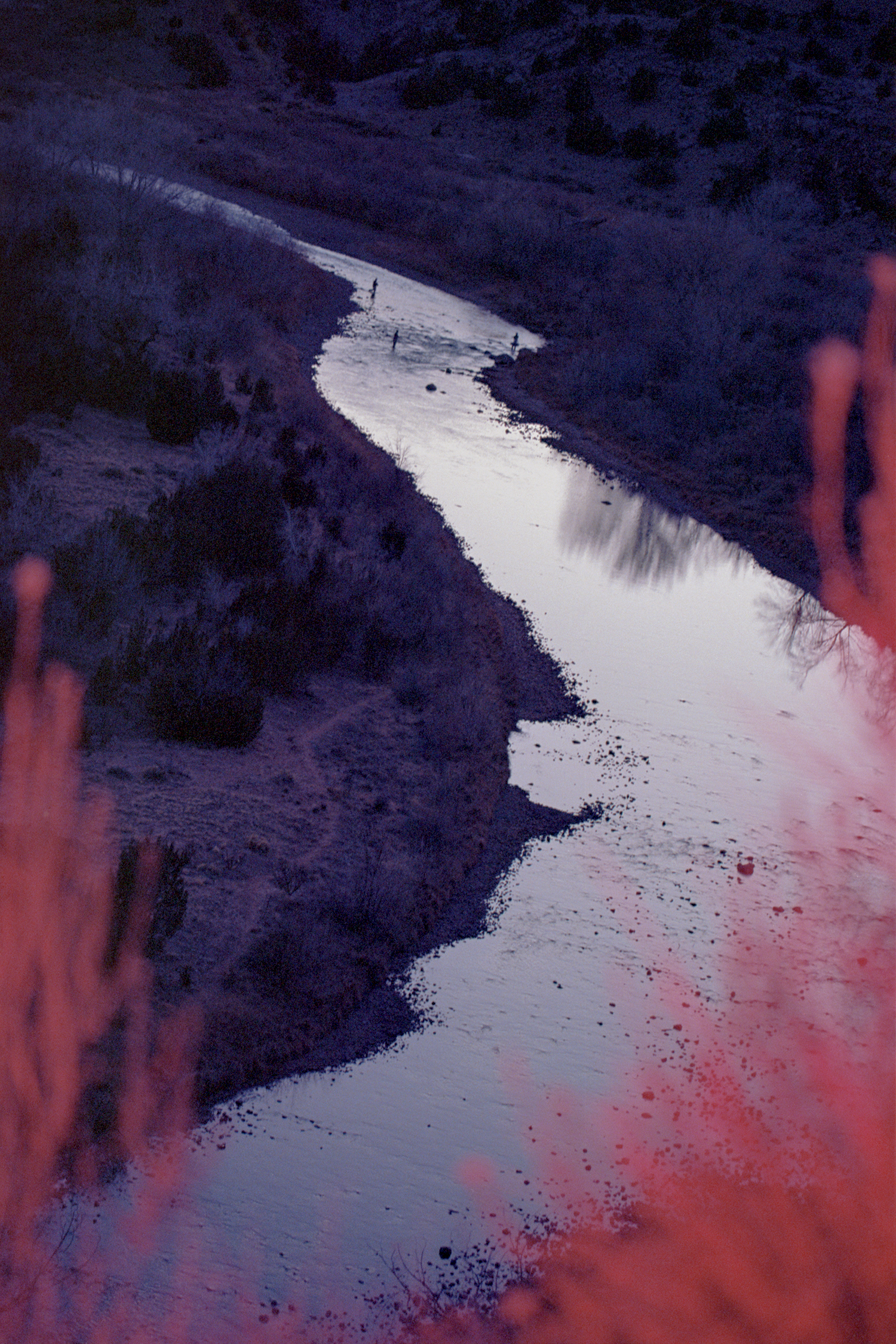
David Brandon Geeting
Justin : Let's see. Let's go on to another photo. I've noticed that you've been taking a lot of self portraiture, especially during the lockdown. Do you think it's easier to get your point across when you're the subject? Or are you doing it more just out of necessity because of the recent social distancing?
David : Mmm, actually, it's funny, before the lockdown I hadn't taken too many. The first time I remember that I really featured my own self in my work was right before lockdown. I put myself in an editorial I shot for Buffalo Zine, because I thought it was funny to break the fourth wall. I happen to be a photographer surrounded by photographer friends who are always photographing each other, just by the nature of what we do. So I'm not afraid to be in front of the camera.
Justin : This is the hippie photo?
David : Mmm, actually, it's funny, before the lockdown I hadn't taken too many. The first time I remember that I really featured my own self in my work was right before lockdown. I put myself in an editorial I shot for Buffalo Zine, because I thought it was funny to break the fourth wall. I happen to be a photographer surrounded by photographer friends who are always photographing each other, just by the nature of what we do. So I'm not afraid to be in front of the camera.
Justin : This is the hippie photo?
David : This is the hippie photo, yeah. It's myself and my girlfriend, Lina. I thought it was funny to, for whatever reason, break that fourth wall and appear in the work. And if you catch it, if you know me, it's like an Easter egg. I admire a lot of photographers that have done that in the past. I know Roe Ethridge does that in his work a lot. There's a whole tradition of it, there's just something funny about it. In quarantine, in the early days, when I was shooting a lot at home, I was thinking, "What do I have here?" I normally have to look outside of myself to make the kinds of images I'm interested in making. Lockdown proved to us that a lot of times, everything you need is right there. The tools are already within you.
.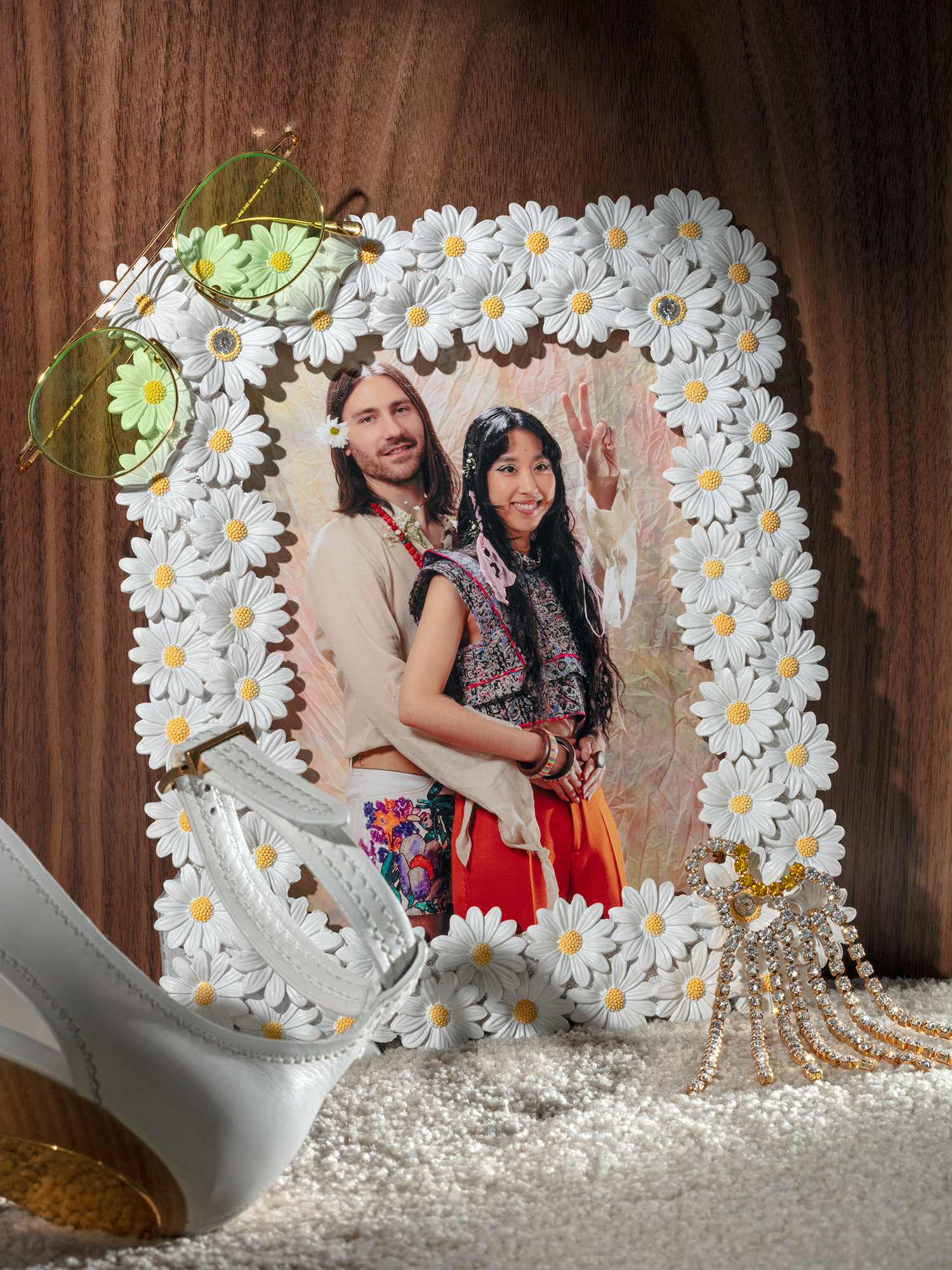
David Brandon Geeting
Justin :
What's the story behind the one where you have the handlebar mustache and it looks like you're sweating? You kind of got like an oversized suit, looks you have a court date you're late for, haha.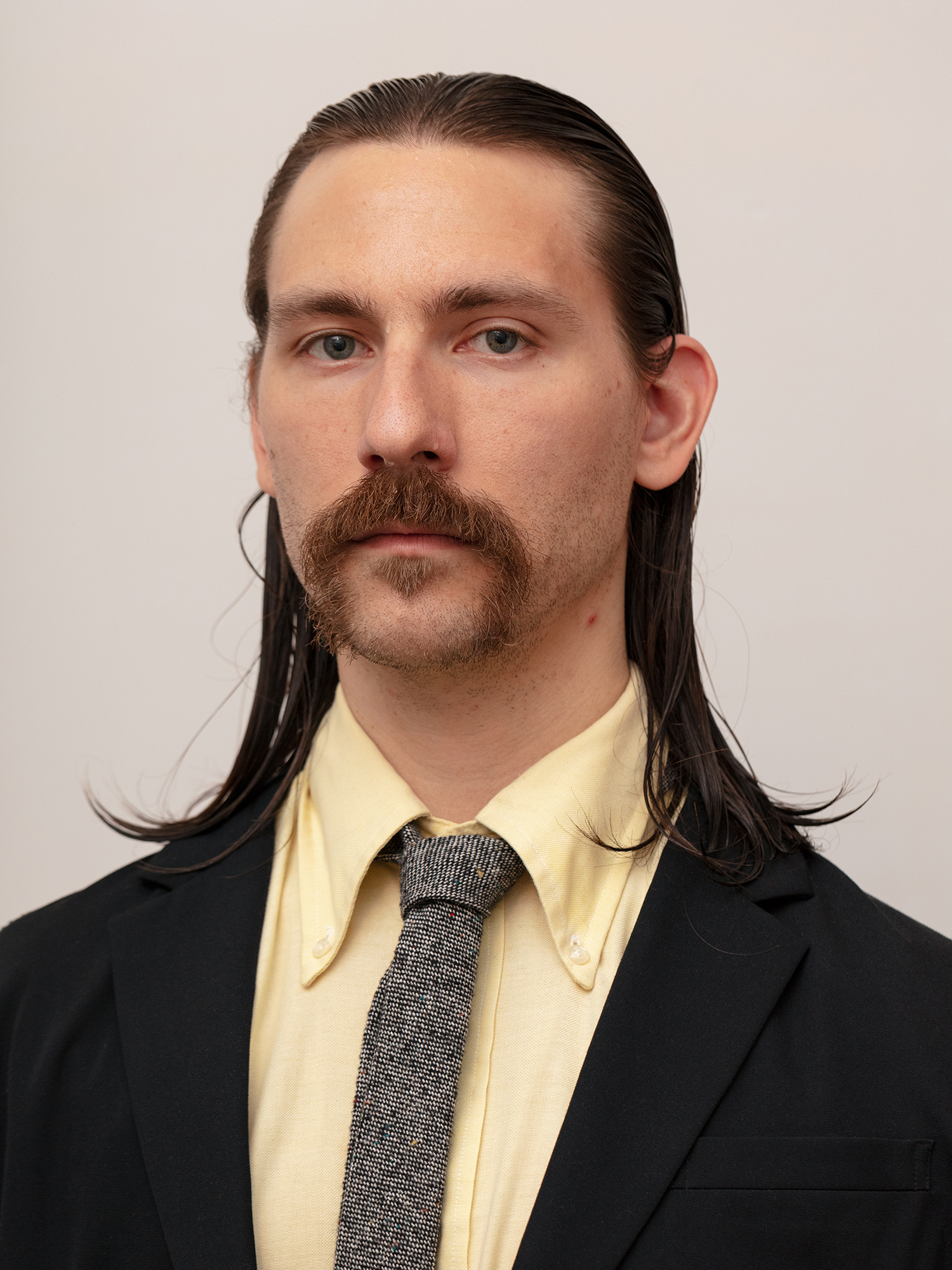
David Brandon Geeting
David : It was more like this interest in taking a really unflattering photo of myself. But one that, in some regards, hits close to home, or maybe who I could have been if I didn't move to the big city from suburban Pennsylvania, or something like that. I don't know. I had facial hair at the time that I was able to sculpt into that beautiful mustache, haha, so I wanted to take advantage of that, too. I was like, "I have a full beard, what looks can we do?" And I think once I saw the mustache in the mirror, I was like, oh yeah, my hair's gotta be wet too. Lina and I had talked about it a bit before, but I think it started to really come to fruition when I saw what I looked like with that kind of mustache.
Justin : You could really read into that photo in multiple ways, it's a very universal character.
David : Yeah, a bit of me was also picturing like a used car salesman, or like, a door-to-door businessman
Justin : I had a guy tell me once, "No logos, nothing that can put your photos in a time or a setting. The more stripped down it is, the more universal it is, the more timeless it can be, and the less limited your photos can be without giving away what you're trying to say." So people can form what their own fantasy is, into the photo.
David : I used to really abide by that rule, which is definitely hard in New York, because there's just logos and signage and billboards everywhere. But it's actually one of the reasons I started shooting with a 100mm lens, because if you get really close to things, you can kind of crop out that unwanted information. But I don't know. My views have shifted a bit on that subject, though I still respect what you're saying.
For instance, say someone is like a huge William Eggleston head, right? And they were like, "I want to be the Eggleston of 2021." But then all they were doing was just walking around looking for, like, old cars in beautiful light, without any logos giving away that it's 2021. That wouldn't really be the 2021 Eggleston. They'd just be like a bad rip off of the guy from back then. You know what I mean?
Justin : Because he was making photos in a very modern way for his time.
David : Yeah, exactly. What you'd really wanna see is, like, pictures of people texting on the J train, and an Ugg boot in a puddle.
David : Yeah, exactly. What you'd really wanna see is, like, pictures of people texting on the J train, and an Ugg boot in a puddle.
Justin : So since we were talking about self portraits, I guess we can talk about that one photo of myself on the roof.
David : Yeah, let's talk about your work!
Justin : For me, I've done self portraits only recently, and I was kind of afraid because I never wanted to give off too much information about myself. But recently, for my new book, I started to break that. Also, because of lockdown, I had no one else to shoot, haha.
For my new book, I've been putting myself in weird, dangerous positions. I guess I grew up in the Jackass era and thinking that it was this new form of manhood. Like a new form of bravery that revolved around self destruction. As a child I just thought, "That's what men do," or something.
David : So crazy to hear that put into words, because subconsciously that's what I felt from the Jackass stuff. Like, yeah, the crazier and riskier you are, the more of a "man" you are. But that's totally not how it should be.
Justin : It's not how it should be, but it's like that when you think about it. Say you're in a Celtic war against another Celtic band of people -- the craziest dude would get the most respect. Say he was like, "I'm gonna go behind enemy lines, take these guys out, and come back." Everyone would make him the hero.
David : The same as like, in the animal kingdom. If you have the funkiest dance for your mate, you'll get picked. You know, there's something very instinctual about that.
Justin : It's about who stands out in a way. But the Jackass version of that is fucked up. So anyway, the photos I've been taking recently have been to get my point across, but in a way that's dangerous or risky, almost in a way to separate myself. I guess maybe I'm living out my primal feelings unconsciously. It's like, my way of thinking is, "I know no one's willing to do this, so therefore no one's photos could look like this." I can't expect anyone to shoot this photo because it could be dangerous, so I'm gonna have to find someone to shoot this photo of me, because I am willing.
David : Yeah, let's talk about your work!
Justin : For me, I've done self portraits only recently, and I was kind of afraid because I never wanted to give off too much information about myself. But recently, for my new book, I started to break that. Also, because of lockdown, I had no one else to shoot, haha.
For my new book, I've been putting myself in weird, dangerous positions. I guess I grew up in the Jackass era and thinking that it was this new form of manhood. Like a new form of bravery that revolved around self destruction. As a child I just thought, "That's what men do," or something.
David : So crazy to hear that put into words, because subconsciously that's what I felt from the Jackass stuff. Like, yeah, the crazier and riskier you are, the more of a "man" you are. But that's totally not how it should be.
Justin : It's not how it should be, but it's like that when you think about it. Say you're in a Celtic war against another Celtic band of people -- the craziest dude would get the most respect. Say he was like, "I'm gonna go behind enemy lines, take these guys out, and come back." Everyone would make him the hero.
David : The same as like, in the animal kingdom. If you have the funkiest dance for your mate, you'll get picked. You know, there's something very instinctual about that.
Justin : It's about who stands out in a way. But the Jackass version of that is fucked up. So anyway, the photos I've been taking recently have been to get my point across, but in a way that's dangerous or risky, almost in a way to separate myself. I guess maybe I'm living out my primal feelings unconsciously. It's like, my way of thinking is, "I know no one's willing to do this, so therefore no one's photos could look like this." I can't expect anyone to shoot this photo because it could be dangerous, so I'm gonna have to find someone to shoot this photo of me, because I am willing.
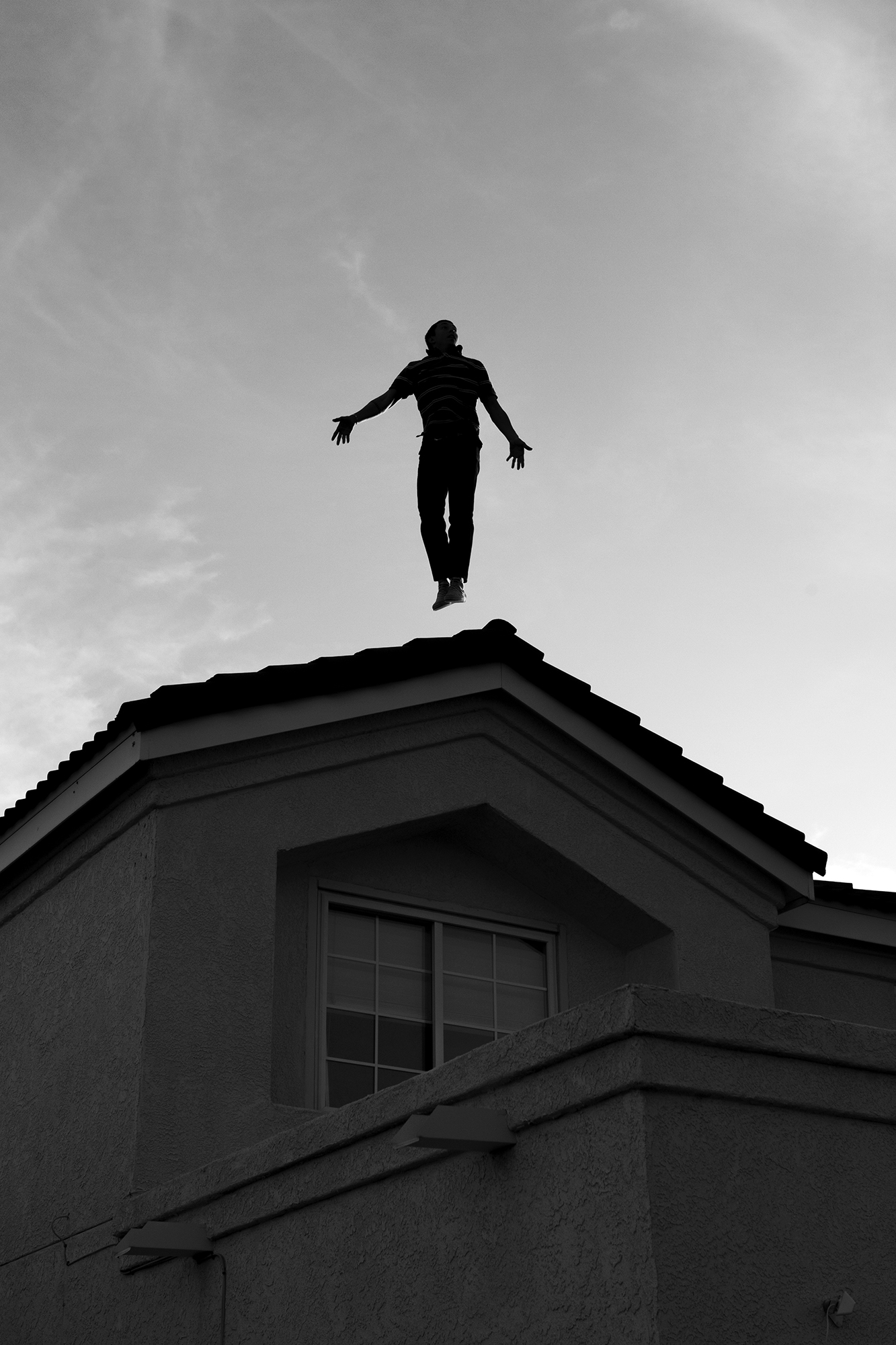
Justin Guthrie
So the photo of me on the roof is the classic acid trip story. The bad story that people tell of someone on acid that jumps off a roof because they thought they could fly. So I went on my sister's roof and pretended to jump off like I'm flying, to kind of like, put yourself in that person's position of how they felt right before they realized they couldn't fly. In that moment, they probably thought they were so enlightened and were about to ascend into another dimension, but that's not reality. So it's this kind of play between reality and fantasy.
David : Yeah, I've seen some of the book, and I've seen some other intense positions you put yourself in for the sake of art. So I commend you for that. With the roof photo in particular, I actually didn't read into the narrative that you have now described. I looked at it and thought it was almost like you were rising to the heavens or something like that. It was almost like your body had been called back to the sky or something.
Justin : In a way, it is that. In the person's head, they're thinking that's true. They're thinking, "Oh, God is calling me back, this is not just an acid trip. I'm going to heaven," and they're jumping and it's like the climax before they start going back down and realizing, "Oh crap, I'm just on drugs. I'm going down."
So it's like this peak of someone feeling so confident in God and the spirits, and it's not just all fantasy as much as like, acid and stuff makes you feel like it is.
David : Let's talk about drugs for a second, because you've been sober for a year, and I'm not sure if you've thought about this, but seeing you do crazy shit in your photos -- to me that really coincides with the fact that you're not doing drugs anymore. It's like, to me, it's you searching for the same kinds of effects or the same kinds of greater-than-life experiences that drugs and alcohol gave you. Instead of you doing the craziest drugs and bragging about them at parties and whatnot, you're just doing the craziest shit in your own photos.
Justin : I think that's very true, because I would do crazy stuff at like a party or like in a friend's backyard, haha. My friends and I would go do something and see who could do the craziest stunt, and then it would stay with us, you know, stay within the five people who were out there doing crazy things. And so with that gone, I don't have that anymore. So I feel the urge to still be doing these kinds of crazy things. But I've learned if I'm gonna do it, I might as well make it worth it and make it art. Doing crazy things while partying is like telling a dream; you could tell anyone about your dream after it happened, but it's never gonna sound as cool as it felt.
David : Well, your photos, in a way, kind of look like re-tellings of stories, because there's a bit of embellishment there. I don't know how much you thought about that, but I guess in particular, I'm talking about the photos that you preconceived and then set up -- not the ones that you find walking around. But even with those, when you kind of curate a collection of your work, you're sort of pushing your own narrative and making it your own. It sort of feels like a weird, trippy, unbelievable tale that you would hear from like, I don't know, one of your grandparents or a weird uncle or something.
So it's like this peak of someone feeling so confident in God and the spirits, and it's not just all fantasy as much as like, acid and stuff makes you feel like it is.
David : Let's talk about drugs for a second, because you've been sober for a year, and I'm not sure if you've thought about this, but seeing you do crazy shit in your photos -- to me that really coincides with the fact that you're not doing drugs anymore. It's like, to me, it's you searching for the same kinds of effects or the same kinds of greater-than-life experiences that drugs and alcohol gave you. Instead of you doing the craziest drugs and bragging about them at parties and whatnot, you're just doing the craziest shit in your own photos.
Justin : I think that's very true, because I would do crazy stuff at like a party or like in a friend's backyard, haha. My friends and I would go do something and see who could do the craziest stunt, and then it would stay with us, you know, stay within the five people who were out there doing crazy things. And so with that gone, I don't have that anymore. So I feel the urge to still be doing these kinds of crazy things. But I've learned if I'm gonna do it, I might as well make it worth it and make it art. Doing crazy things while partying is like telling a dream; you could tell anyone about your dream after it happened, but it's never gonna sound as cool as it felt.
David : Well, your photos, in a way, kind of look like re-tellings of stories, because there's a bit of embellishment there. I don't know how much you thought about that, but I guess in particular, I'm talking about the photos that you preconceived and then set up -- not the ones that you find walking around. But even with those, when you kind of curate a collection of your work, you're sort of pushing your own narrative and making it your own. It sort of feels like a weird, trippy, unbelievable tale that you would hear from like, I don't know, one of your grandparents or a weird uncle or something.
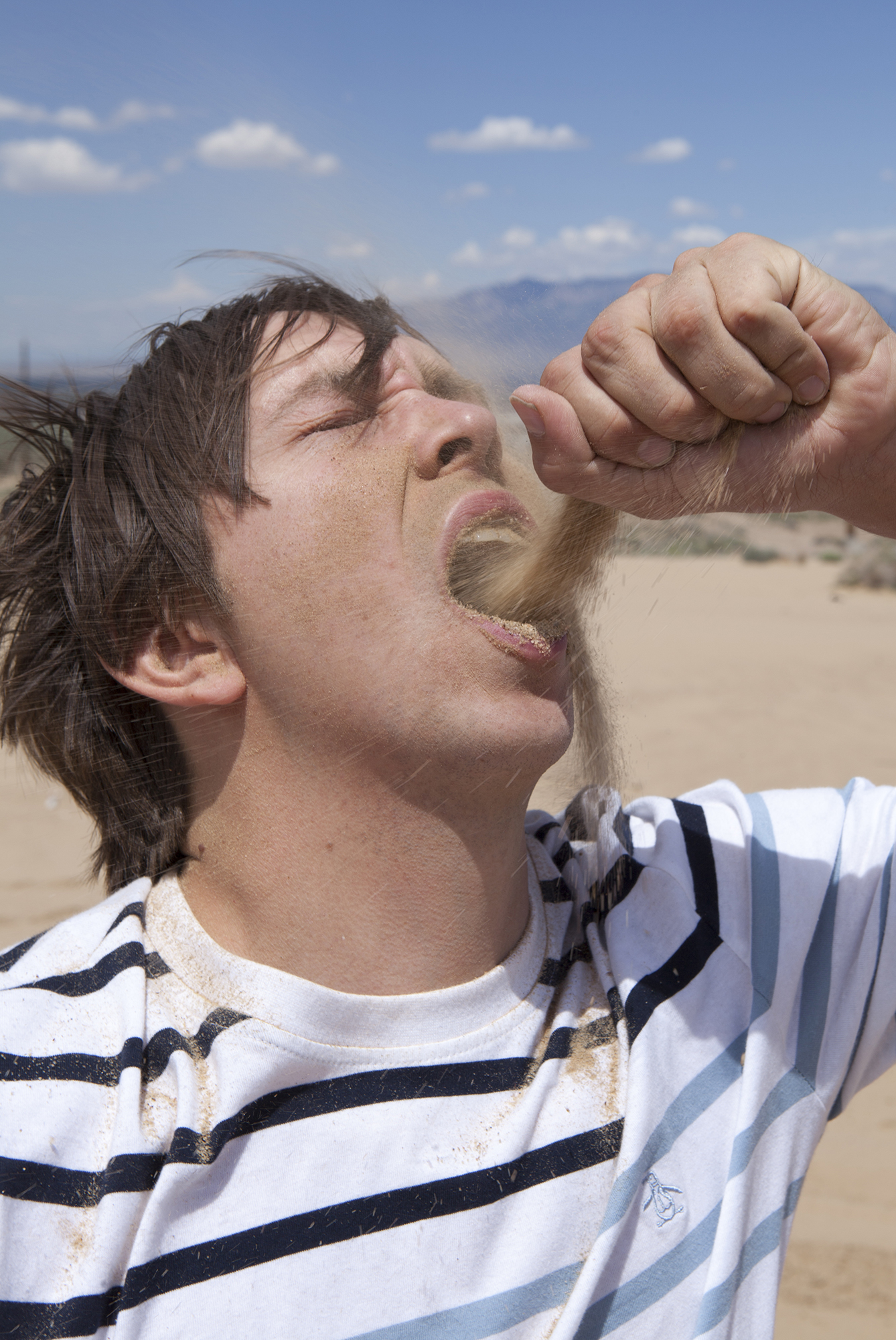
Justin Guthrie
Justin : I guess that's true. Because, I like to play with reality just in my own head, just for fun. And I think drugs were part of that; I always felt like reality was too limiting. I never wanted to accept that life was so limiting. I think the drugs and drinking and stuff was a way to make reality more interesting. But then after a while, the drugs and drinking just kind of gets old, and that becomes reality at one point, and then you're trying to get out of that reality. Art has become my new way of playing with reality.
David : Exactly.
Justin : That's why I've always been attracted to your photos, because it felt like, for lack of better words, it felt like a drug. Or I'm like, "Wow, what is going on here?" Like I understand it's all in your perception in your head of how you see the world, but it's like I'm stepping into a different world, and it makes life feel grand. It's a nice reminder.
David : Thanks man. That means a lot. I mean, I feel similarly about your stuff. I don't believe luck to be real, but when I see a lot of your work, I'm like, "Damn, this guy is so lucky with what he finds." Just the way everything kind of seamlessly fits into this world that you're building. Like even with that radio that you found in the L.A. River, I'm like, what the fuck? That's so perfect.
Justin : Thank you. So this girl who's a friend of mine had told me, "I can't believe you just find all these things to take photos of all the time?" And the funny thing is, I set up a lot of what she thought I found. I thought that was interesting, but I actually do want people to know that it was intentional, so they could read more into it, instead of just going, "Well, that's crazy you saw that," and not reading into the photo any further. Photography seems to be easily written off, like what we were talking about earlier.
David : Right?!
Justin : With my new work, I want it to be ultra obvious that I set these photos up, so you can draw more meaning out of them, so that you're almost forced to think about it. So, using my friend as an inspiration, I have to think, "Okay, I need to make this so obvious that people know I created this photo for a reason. They have to think about it."
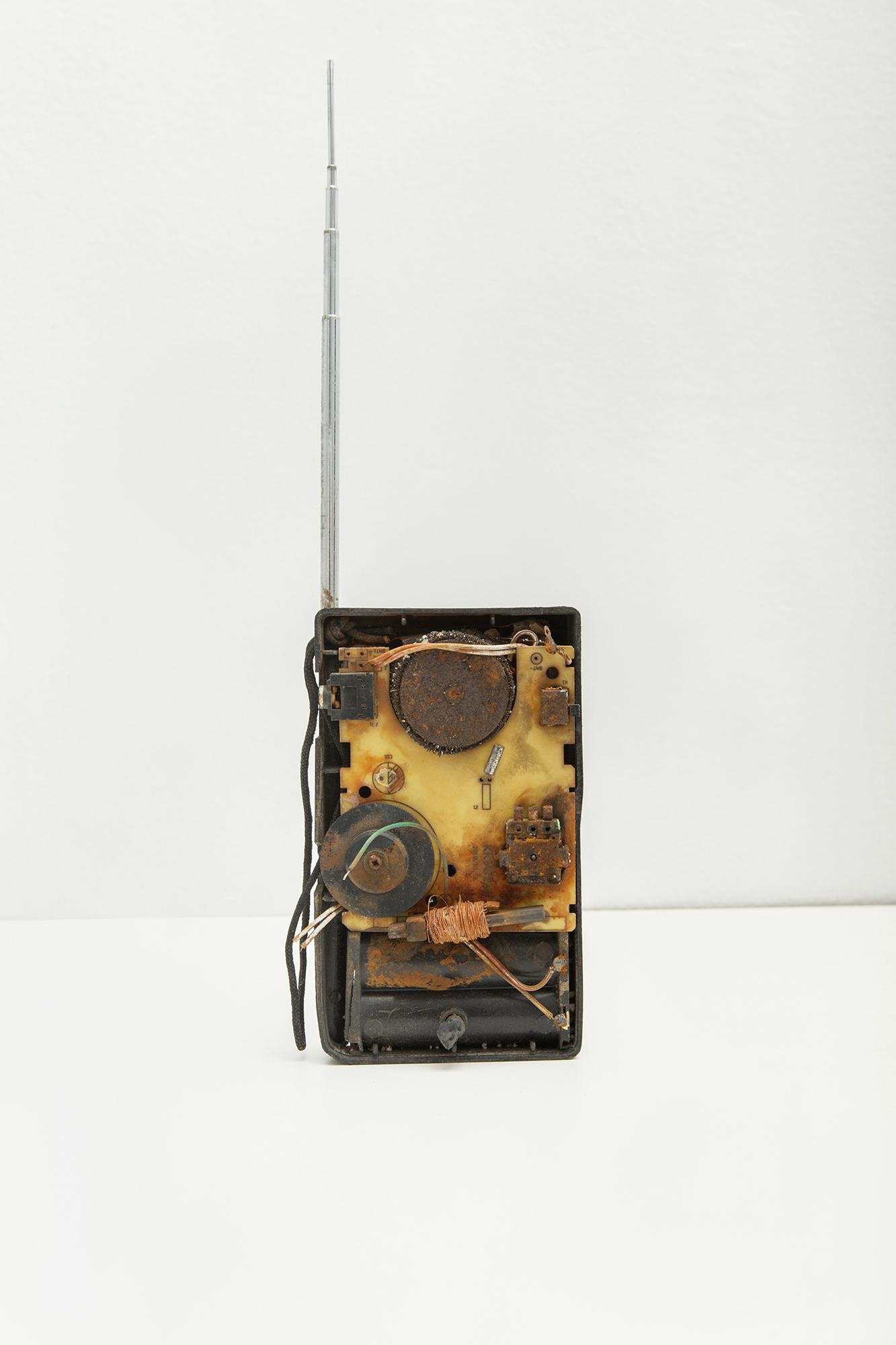
Justin Guthrie
David : I don't know if you can relate to this, but what is it with people being more impressed if something was found in photography rather than if it was set up? Have you noticed that at all? People are like, "Whoa, that's crazy you saw that!" You know what I mean? But if you make it, they're kind of like...
Justin : Yeah, I guess I can see that. It's like, okay, you go to the zoo and you see a lion, that's pretty cool. But if you see a lion in the wild, that is insane!
David : The other thing I wanted to say is, I guess sometimes with my audience, something that I run into is that, since most of my work is set up, set up work inherently must "mean" something. Set up work always has to be really fleshed out and have a thought-out deeper concept and meaning. It's not like walking around with a camera, where things are kind of happenstance. If you're setting something up, that must mean that, "Oh, there's something to read into here. I wonder what he was thinking." But you know my work, and you know me, and you know, a lot of times I almost treat the studio as if I were on the street. Except, instead of stumbling upon something, I'm kind of stumbling into making something. It's like I'm walking through my mind, and then whatever sticks, I'm like, "Oh, I'll add that there." It's very nice in the moment.
Justin : Yeah, I guess I can see that. It's like, okay, you go to the zoo and you see a lion, that's pretty cool. But if you see a lion in the wild, that is insane!
David : The other thing I wanted to say is, I guess sometimes with my audience, something that I run into is that, since most of my work is set up, set up work inherently must "mean" something. Set up work always has to be really fleshed out and have a thought-out deeper concept and meaning. It's not like walking around with a camera, where things are kind of happenstance. If you're setting something up, that must mean that, "Oh, there's something to read into here. I wonder what he was thinking." But you know my work, and you know me, and you know, a lot of times I almost treat the studio as if I were on the street. Except, instead of stumbling upon something, I'm kind of stumbling into making something. It's like I'm walking through my mind, and then whatever sticks, I'm like, "Oh, I'll add that there." It's very nice in the moment.
Justin : It's like John Frusciante's solo work in the nineties; he said he played what the spirits demanded, every note he played was entirely of feeling, so the songs have no real structure at all, but they're beautiful and ephemeral. He definitely was on a lot of drugs, but I mean, you could say spirits, but you could also just say your feelings or your impulses. It's like free jazz in a way. You could even make up that it's like still life jazz, what you're doing, haha. It's like there's no chorus, bridge or verse, it's just, "Here's what's going on: I'm putting this here and here because it makes me comfortable." It's like OCD. You know exactly how it makes you feel comfortable, even if it's not logical.
David : I mean, I have crazy OCD, I've had it since I was a kid and I've gone to therapy for it and stuff. And I'm a musician and I often think about music first. Like when I'm making my work, and especially when I'm editing it and rearranging it. I think about song structure or like the track listing on an album. Like, you can't have two sad slow songs next to each other. You know what I mean? Just sort of like the dichotomy between types of songs or types of images next to each other and what that does to the flow of the whole thing. I'm always thinking about that stuff, and I guess I'm thinking about individual parts of an image when I'm composing a photo, too. Although I have to say, I'm working on a new book as well, and a lot of it (not all of it), but a good portion of it, is kind of preconceived. I've been doing much more of that, much more looking at what I already have and trying to fill in the blanks, which is not something I normally do. I normally just improvise all the way and then see what I got, then throw something together.
Justin : Speaking of your new book, what's it called? I noticed that the first photo on the Instagram post you made is like, some onion, a rock, and an abalone shell on an old tree stump. What is this still life about?
David : The Marble. That is what the book is going to be called, The Marble. Which is a reference to "The Blue Marble," which is a nickname for the Earth. Also, the first photograph of Earth ever taken was called "The Blue Marble." Anyway, for that image, I found the tree stump, and somehow it was the perfect stage for me to build this photo. But the idea actually came from a documentary I watched about octopuses. The octopus does this thing to shield itself from outsiders or enemies; it'll just gather a bunch of things that are close to it and kind of surround itself with these objects. It's just miscellany, floating in a circle. I kind of had that in mind.
Justin : I would have never known that or guessed that. But of course, you could almost say that a lot of your still lifes come from that point of view. It's like it doesn't matter what's around, just what makes you feel safe and comfortable.
David : Crazy man, it's funny because it's so just related to that image, but hearing you say that, I do feel like a lot of my work has to do with a similar theme. But yeah, a lot of the other images in that Instagram post and in the book are from walking around, they're sort of like what we were talking about before, about being rooted in documentary photography, but they also don't really have anything to do with that. In some of them, I'm changing the color of the landscape with gels or kind of interfering in some way. I always feel like the editing process in general is all about interference with a "normal" narrative.
Justin : It's interesting, because I kinda do what you said earlier about still life, that there has to be this overall meaning, at least traditionally. The one still life you picked from me, the dog toys --
David : Oh yeah, I love that photo.
David : The Marble. That is what the book is going to be called, The Marble. Which is a reference to "The Blue Marble," which is a nickname for the Earth. Also, the first photograph of Earth ever taken was called "The Blue Marble." Anyway, for that image, I found the tree stump, and somehow it was the perfect stage for me to build this photo. But the idea actually came from a documentary I watched about octopuses. The octopus does this thing to shield itself from outsiders or enemies; it'll just gather a bunch of things that are close to it and kind of surround itself with these objects. It's just miscellany, floating in a circle. I kind of had that in mind.
Justin : I would have never known that or guessed that. But of course, you could almost say that a lot of your still lifes come from that point of view. It's like it doesn't matter what's around, just what makes you feel safe and comfortable.
David : Crazy man, it's funny because it's so just related to that image, but hearing you say that, I do feel like a lot of my work has to do with a similar theme. But yeah, a lot of the other images in that Instagram post and in the book are from walking around, they're sort of like what we were talking about before, about being rooted in documentary photography, but they also don't really have anything to do with that. In some of them, I'm changing the color of the landscape with gels or kind of interfering in some way. I always feel like the editing process in general is all about interference with a "normal" narrative.
Justin : It's interesting, because I kinda do what you said earlier about still life, that there has to be this overall meaning, at least traditionally. The one still life you picked from me, the dog toys --
David : Oh yeah, I love that photo.
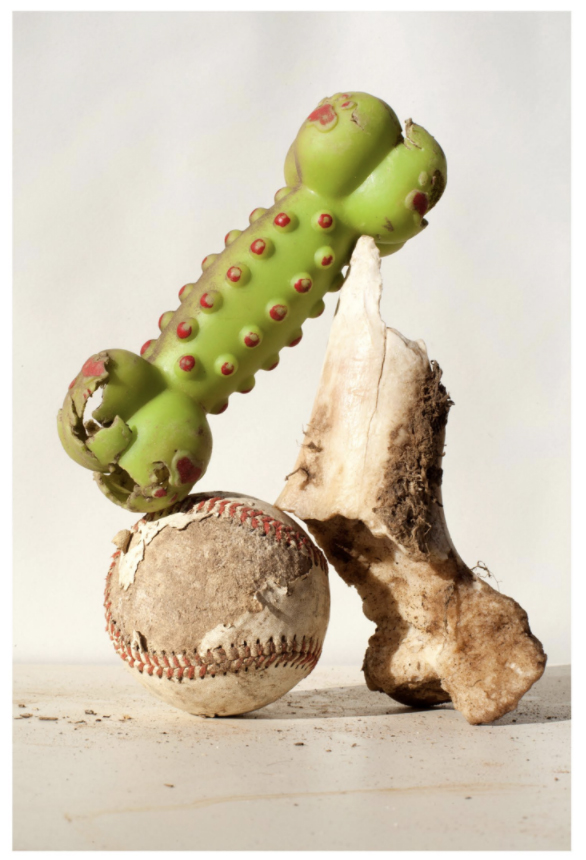
Justin Guthrie
Justin : So I've been really into Freud and Jung the last, I don't know, 5-10 years, and just applying it to my own life and what it means and how perhaps I'm not so removed from an animal as much as I think I am. And then from there, looking at my dog and seeing how they act. I heard this thing that dogs like to bite things because they get a thrill out of killing. But the way they justify that is to chew on things that aren't, you know, rabbits or kitty cats. It's just a toy and they know that they can get away with it. So it's like a win-win. It's like, okay, I still get to itch the primal urge of killing something, yet it's safe because my owner won't get mad at me. And I get to keep living in the house and eating. So I got all his dog toys, and I put them in a still life position to represent how we're not so different from the dog either, you know, playing Call of Duty and Grand Theft Auto, doing things that people do to get their weird, primal urges out.
It's like perceived as normal if society deems it okay, like war is "cool" because it's for your country, and death and killing are a part of that. But of course, it's wrong to do that on the streets just because you feel like it, and it's not so much different than a dog going at it on a baseball, but what it really wants to do deep in its subconscious is to kill a rabbit. Yeah, that was what that was all about.
David : Well, I like that for you. I mean, I don't mind a meaning, and I was thinking about trying to make this point earlier, but couldn't figure it out: the thing with "meaning" and even the Beach Boys songs we're talking about is that, in the end, it doesn't really matter. Like, your photos are good, and I like the dog toys still life, and I think it jives with your other work, but the meaning of it doesn't make or break the work for me. A lot of times someone will present a photo, which I think is really bad, and then they'll be like, "No, no, you don't understand! Here are all the things I'm thinking about," and it's like, well, I don't really care, because it's not showing in the work, you know what I mean?
Justin : That's true. I mean, there's room for everything. I like the Beach Boys as much as I like Bob Dylan, there's always room for everything.
It's like perceived as normal if society deems it okay, like war is "cool" because it's for your country, and death and killing are a part of that. But of course, it's wrong to do that on the streets just because you feel like it, and it's not so much different than a dog going at it on a baseball, but what it really wants to do deep in its subconscious is to kill a rabbit. Yeah, that was what that was all about.
David : Well, I like that for you. I mean, I don't mind a meaning, and I was thinking about trying to make this point earlier, but couldn't figure it out: the thing with "meaning" and even the Beach Boys songs we're talking about is that, in the end, it doesn't really matter. Like, your photos are good, and I like the dog toys still life, and I think it jives with your other work, but the meaning of it doesn't make or break the work for me. A lot of times someone will present a photo, which I think is really bad, and then they'll be like, "No, no, you don't understand! Here are all the things I'm thinking about," and it's like, well, I don't really care, because it's not showing in the work, you know what I mean?
Justin : That's true. I mean, there's room for everything. I like the Beach Boys as much as I like Bob Dylan, there's always room for everything.
David : True. And I should say about my book, The Marble -- I wanted to say that the work is deeply personal because I feel like I live in a fantasy world. Often times, I feel like I can't relate to people, just with the way my brain works, and the way I feel like I go in circles to try and explain something. Also, like how you describe doing drugs as a kid, doing acid or psychedelics as a young kid, and since then, the world feels different to you, like it's more spiritual or things have more meaning -- I feel like I've always felt that way, like I still feel five years old in some aspects. So in this book in particular, I kind of wanted to use the Earth as a stage for something else, for some kind of fantasy tale or excursion. A lot of the stuff that is shot outside is to basically set a scene for where everything else takes place, and a lot of the other stuff that I'm doing is in studio or is setup outside somewhere. I'm explaining it to you, because I know that you like this kind of thing, but really I like it when people are confused and they don't know what is set up and what is not.
Justin : Yeah. I really like what you're saying. The world's a stage. I have the firm belief that no one is right. Actually, I like what my friend Pat says -- his religion is a self-proclaimed "bigot agnostic". He's a bigot about not knowing anything, and he's a bigot about no one knowing anything. And if you think you know the truth or the reality of what really is happening, you're kind of crazy. And you may be a little too overconfident, because there's no way you could really, really know.
David : Yeah, no one knows.
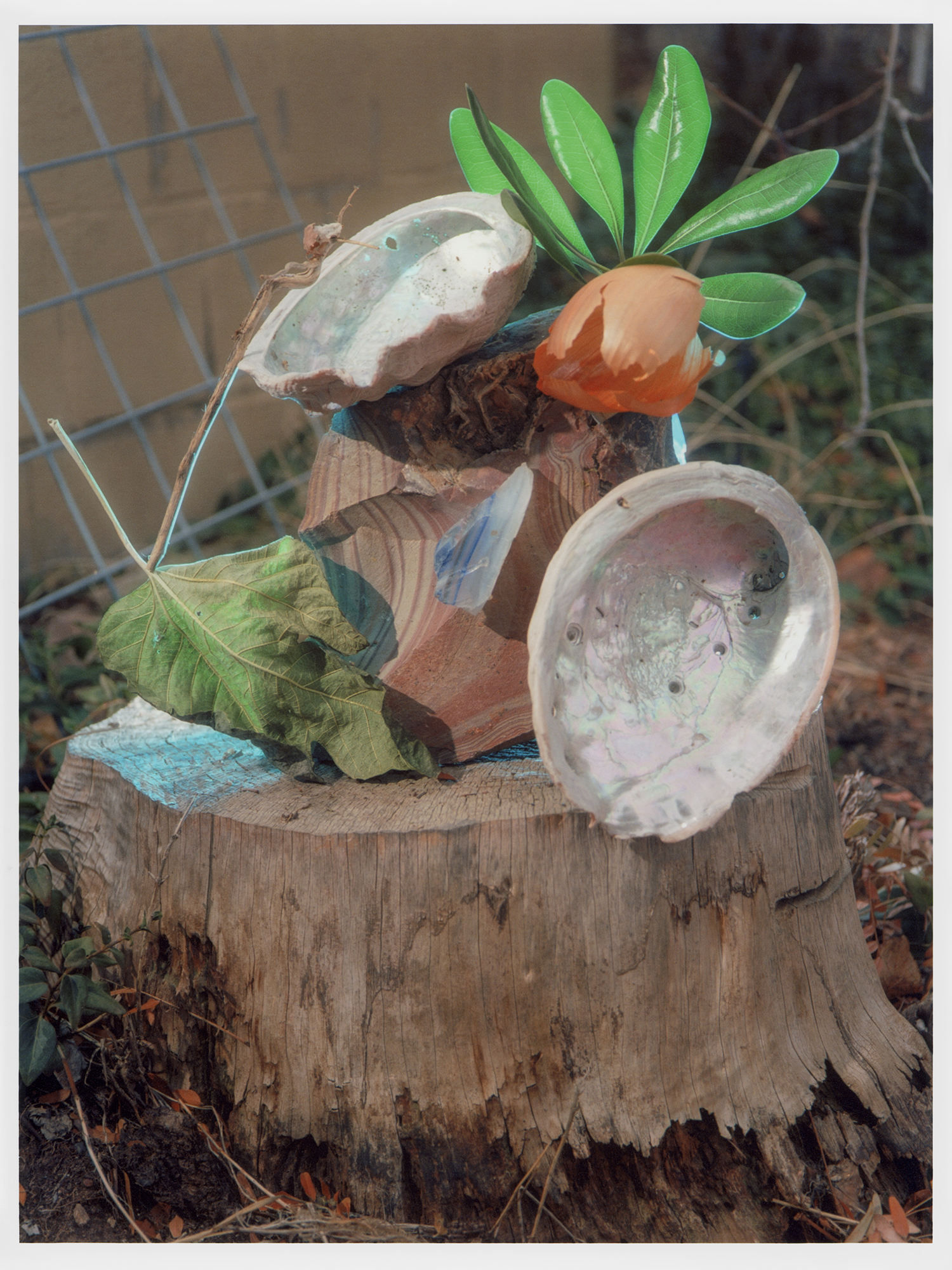
David Brandon Geeting
Justin : There's no real reasoning why beautiful music can make the hair stand up on your neck. There's no scientific reasoning for that. I really like that project that you're making, because it's very Shakespeare in a way, with what he said about the world being a stage and anything that falls in between is just "life's play."
David : 100%. I mean, that's exactly it, and you know what else? It's funny to think of the things I'm setting up in my studio as "fantasy" photographs, because they're really happening. I'm making them happen for a second while I take the picture. Do you know what I mean? So then, it's not like they're a lie -- they did happen on this Earth, which is the stage for the book, so I don't know... something to think about.
Justin : I've always looked at life anyways how Eastern philosophies believe it to be, that this is all an illusion. The Hindus call the illusion Maya. Even science inadvertently backs that. Something like 99.99999% of every object on earth, even the air, is just empty space, it's just electrical energy that connects the neutrons and the electrons and the protons. Those are like physical matter, but in between, there's just essentially nothingness. It's nothing. The faster or slower it's moving is what makes it appear solid or not solid.
David : So crazy, man.
Justin : I mean, I'm literally no different than a lamp, because I'm the same protons and electrons. We just have different atomic coding.
David : Listen, man. I feel like we covered some pretty good ground. What do you think?
Justin : I think we did.
David : Yeah, I'm excited dude. Thanks for thinking of me.
David : 100%. I mean, that's exactly it, and you know what else? It's funny to think of the things I'm setting up in my studio as "fantasy" photographs, because they're really happening. I'm making them happen for a second while I take the picture. Do you know what I mean? So then, it's not like they're a lie -- they did happen on this Earth, which is the stage for the book, so I don't know... something to think about.
Justin : I've always looked at life anyways how Eastern philosophies believe it to be, that this is all an illusion. The Hindus call the illusion Maya. Even science inadvertently backs that. Something like 99.99999% of every object on earth, even the air, is just empty space, it's just electrical energy that connects the neutrons and the electrons and the protons. Those are like physical matter, but in between, there's just essentially nothingness. It's nothing. The faster or slower it's moving is what makes it appear solid or not solid.
David : So crazy, man.
Justin : I mean, I'm literally no different than a lamp, because I'm the same protons and electrons. We just have different atomic coding.
David : Listen, man. I feel like we covered some pretty good ground. What do you think?
Justin : I think we did.
David : Yeah, I'm excited dude. Thanks for thinking of me.
____
Justin Guthrie is a Southwest based photographer who uses the teachings and philosophies of the old world to make sense of the new world, finding a balance between the two through visual poetry.
David Brandon Geeting is a New York based photographer who bridges genres, composing a colorful world which balances skillful chaos with wide eyed photography.
